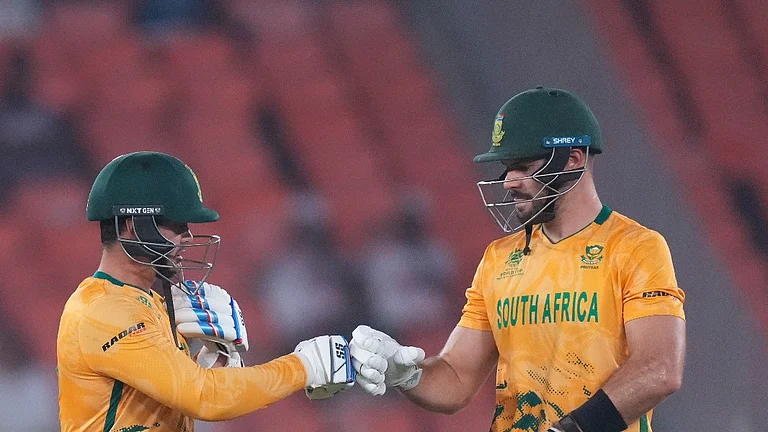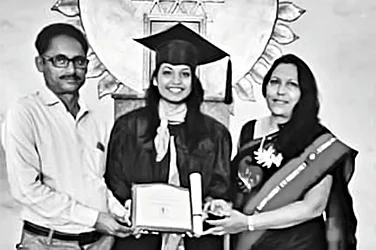Shivam Shinde's life depends on the machines around him. Plastic tubes stick out like umbilical cords, connecting his fragile body to various modern-looking contraptions. A dialysis machine flushes out his system. A ventilator helps him breathe. Blood and plasma transfusions prop his flagging haemoglobin count. The last time he was in hospital was five months ago. That was the day he was born.
Kawaljit Kaur singh :This 14-year-old suffers from thalassemia major (average life-span 21 years) and aspires to be a judge. She also met one besides filmstar Sunil Shetty.
Shane Jude Fernandes is still to get home. Born one-and-a-half months ago, he developed respiratory problems soon after and was flown down from Goa on oxygen support. One heart surgery later, it looks like Shane is finally homebound.
Varun Nagaonkar bends over his colouring book. He chooses green for the doggie, like most four-year-olds would. His mother says he has a problem with his haemoglobin count; his eyes and tongue were white when he was brought in. What she doesn't know, or isn't telling, is that he's been diagnosed with leukaemia.
Zuhi : This six-year-old girl (seen here with her adopted father) suffers from leukaemia. She is now at the Institute Rotary Cancer Hospital, a speciality wing of the All India Institute of Medical Sciences. She belongs to a village in Badayun, UP.
Prabhat (name changed) came to the children's home run by Delhi-based ngo Sahara, after his parents succumbed to aids. He thinks that his potent breakfast of four tablets and a spoonful of syrup is treating his tuberculosis. He will probably never grow up to understand that he also has HIV.
All these children are newcomers to this world. But sickness and pain are not new to them. While kids their age are warding off schoolyard bullies and chicken pox, these children are fighting a battle they can't afford to lose. The battle for life in a paediatric ICU where death is always around the corner and where life means chemotherapy, or regular hospital checks, or just looking over your shoulder every once in a while.
Says Shane's mother Elizabeth: "You have to be a strong mother and have a positive outlook." And though optimism is hard to come by in such circumstances, Shivam's parents, who have been camping outside the ICU for days, are determined not to crumble with despair. "We hope that he gets better," they say. But it's Varun's mother, Varsha Nagaonkar, who exhibits perhaps the highest degree of sang-froid. The abyss gapes at her and yet she musters the will to hope: "Of course he's in a hospital so I'm scared, but he'll be fine soon." Cryptic words shut out the dark.
Varun : He, like any other 4-year-old, loves his drawing book. His mother doesn't know or won't say that he has leukaemia.
Entire families are waiting gracefully, with fortitude. By the bedside, until a sleeping child awakes. In the playroom, armed with paintbrushes and crayons. In the corridors, talking to others like them. With their doctors, measuring up their chances and haggling for a little more time. Courage for them, it seems, is hereditary. And faith too.
Mina Goswami though is running out of faith. Her only child Navanita was diagnosed with cancer two months ago. The Goswamis made their first visit to Mumbai to find treatment for their daughter. "I thought she'd be a doctor," Mina's voice peters out.
SAMINUR : This 8-year-old boy in Calcutta has acute haemophilia. He suffers from internal bleeding in his stomach.
Navanita has just turned nine. This birthday might be her last. So this year, the celebrations are very special. In more ways than one. There are more than 20 kids at the party. They all have cancer. Age, gender, all distinguishing features vanish; with their tonsured heads and their protective face-masks, only their eyes speak - they light up in unison with the candles on the birthday cake. The trappings of cancer can't hide the fact that they are just children, braving a disease that makes grown-up men cry.
"If she is not here, our lives will be over," cries Navanita's father, Nishikanta. "We will never leave Bombay." The child is not the patient as much as the parents are, according to Dr Soonu Udani, head of the paediatrics department at Mumbai's Hinduja Hospital. "The child is on medication, or under sedation. But it's very hard for parents to accept that the situation is unsalvageable." For doctors, communicating their helplessness is a heartless task. Parents want to believe that if their money can buy the best medical care, the road to recuperation will be a sure, if long, one.
Karthik : He is eight years old, belongs to Bangalore and he dropped out of school when he was diagnosed with leukaemia. His father finds it tough to pay for his medication.
It doesn't help when the money lasts shorter than the treatment, and a dying child becomes a drain on the family income. When Nataraj and Amudha were told that their 10-year-old daughter, Geetha, has Ewings Sarcoma and that the initial course of treatment would cost Rs 4 lakh, they first contemplated suicide. For Nataraj, a labourer, the cost was unimaginable, especially when there were two other children to look after.
Karthik's parents had to walk the same tightrope between saving one child's life and ensuring a secure future for the others. Their eight-year-old son quit school after he was diagnosed with leukaemia 15 months ago. He has gone through chemotherapy and radiation; and the expenditure incurred so far has been Rs 2 lakh. "He needs treatment for another 16 to 18 months," cries Shivakumar, Karthik's father, who is employed in a power-loom unit. "It's very difficult to bear the expenses with my salary."
For Manish Yadav's parents too, financial constraints were proving to be a great hurdle in saving their son's life, but thanks to the publicity provided by the electronic medium and the local press, the situation was brought under control in the nick of time. "This is his (Manish's) second life," his surgeon Nirmal Gupta, at the Sanjay Gandhi Post Graduate Institute of Medical Sciences in Lucknow, proclaims proudly.
Manish smiles at his mother Meera as she holds him tightly. She had no idea what her son's ailment was. Avers she: "He used to turn blue sobbing and have irregular breathing, but now he seems fine." Manish had a hole in his heart.
Manish : This new-born baby, currently in SGPGIMS, Lucknow, had to undergo a heart surgery. His parents had lost hope as they didn't have money. Donations saved the day.
For chronic cases, resignation often replaces initial panic and fear as medical bills mount and the sickness takes a turn for the worse. Doctors get blamed a lot by angry parents who feel shortchanged when a healthy child takes ill and dies. These are the parents who need counselling desperately, to understand why the medical fraternity failed and why they lost a child. Counselling also helps prepare the parents and maybe, even the child, for the bleak road ahead - whether parents should tell an older child that he might die. Or urge them to express their emotions to the child before it's too late. And to include other siblings who might be feeling left out.
No wonder then that voluntary organisations are targeting the entire family. VCare, a non-profit emotional support group for cancer survivors, organises family outings to involve parents and siblings in the healing process. Cancer patients are introduced to two other cancer survivors to emphasise that cancer isn't another word for terminal. "People say you are dying with cancer - why don't they say that you are living with it?", asks Vandana Gupta, founder of VCare, herself a cancer survivor.
Emotional support, according to Gupta, means many things. To some, it means financial help; to others it means finding a place to stay; and there are also those for whom it means talking to somebody who isn't wearing a doctor's coat.
For younger children, death itself means very little. "They know that they are not feeling well, but what they fear most is that they'd wished they'd become someone great, or take part in some competition," says Gupta. "The interruption seems to upset them more than death itself."
Udai Joshi, founder of Make-A-Wish Foundation of India, understands the value of a wish all too well. Especially for a sick child whose short existence doesn't give him enough time to fulfil the wish on his own. Joshi's son, Gandhar, went to the US to get treatment for leukaemia. He died at the age of 10, after the US based Make-A-Wish Foundation granted him his last wish. A family trip to Disneyworld.
Joshi set up the Indian foundation in 1996 to gift happiness to terminal kids. Make-A-Wish volunteers visit hospitals regularly and find children who have been certified as terminal cases. "We build rapport with the parents and the child," says Joshi. "We can fulfil any wish."
Fourteen-year-old Kawaljeet Kaur Singh made two wishes - to meet Sunil Shetty and to meet a judge. Kawaljeet suffers from thalassemia major; the average lifespan for such patients is 21 years. Yet, she dreams of becoming a judge. "Even when I see the photographs, I feel so thankful," she says, her face aglow as she recalls the day and runs her fingers lovingly over the photographs.
For a kid who loves singing and dancing, Navanita's wish was predictable: to dance before a large audience. Make-A-Wish Foundation made the arrangements and Navanita danced. Not to one song, as planned, but to two. "We laughed more than we ever have," gushes Mina, overwhelmed. Now Navanita has only one more wish: to get well so that she can get her hair back.
These organisations provide the human touch. Not a small thing. Only dwarfed in the face of huge medical bills that need to be paid. Shivam's parents are borrowing money to keep him alive; concerns about repaying it have been deferred for now. And miracles do happen. Since Outlook did this story, Shivam has made a startling recovery. His cancer went into natural remission, his kidneys recovered and he has gone home. Shane has gone home too. For that half-a-chance that they would live, the cost was worth it. But for the majority of Indians, even that half-a-chance is unaffordable.
In Mumbai, Kawaljeet's treatment costs Rs 1,100 per month. Her father, a cabdriver, has to shell out only Rs 350, the rest is covered by the Mumbai Thalassemic Society. In Bangalore, the Shristi Special Academy runs a project called Drishti, to support terminally ill children like Karthik and Geetha with the help of donations.
If a parent weathers the financial crunch, there is the absence of formal bereavement counselling when a child dies. But in India, strong family support makes up where professional services are missing. And the role of good, old-fashioned fortitude can't be emphasised enough. Grief is followed by relief that the child isn't suffering anymore. And therapists say that parents even visit them after the counselling period has helped them tide over the sorrow. Some of them come to talk and share photographs. Yet others come with the good news that they are expecting children again.


















